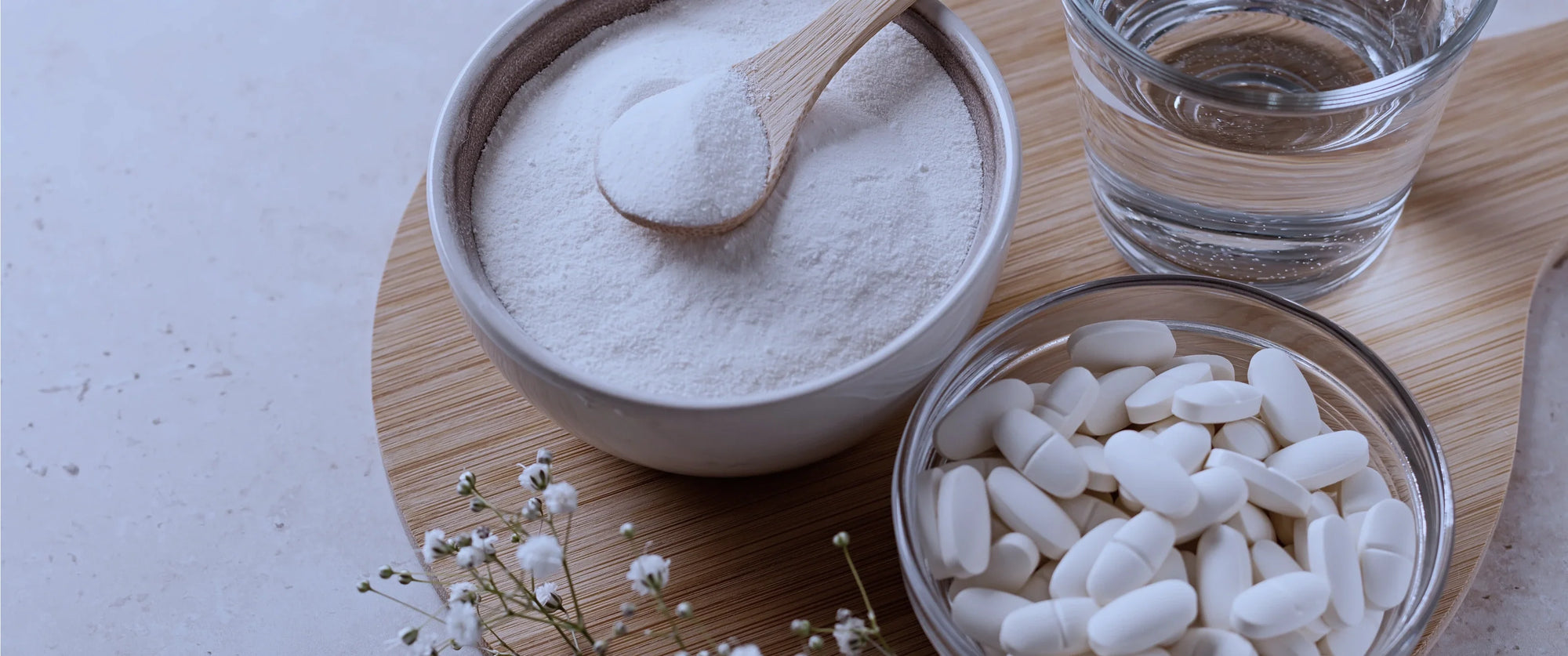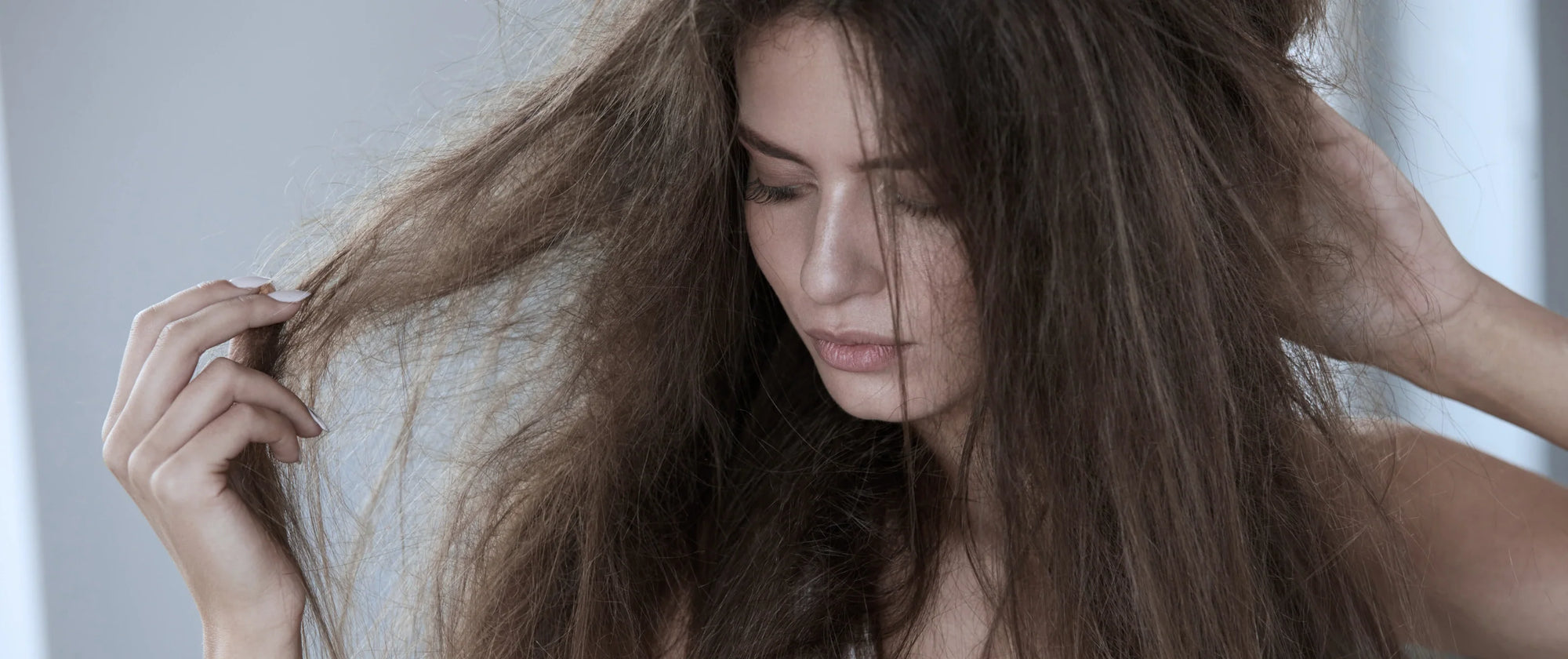“Collagen is the glue that holds the body together—it gives strength and structure not only to our skin and joints, but also to the very follicles that grow our hair.”
– Dr. Josh Axe, Clinical Nutritionist & Author
“As we age, the decline in collagen is inevitable. The smart approach isn’t just topical—it’s nutritional.”
– Dr. Mark Hyman, Functional Medicine Physician
Collagen has become one of the most talked-about supplements in wellness circles, but beyond the hype, there’s a strong scientific basis for its role in hair health.
Why Your Hair Feels Different After 30
If your once-thick, glossy hair now feels more brittle, frizzy, or flat, you’re not imagining things. Biologically, the 30s and 40s mark a turning point for many women: collagen production naturally declines by about 1% per year, and oxidative stress accumulates in the body.
With less collagen, the scalp’s dermal layer loses elasticity and hydration. Hair follicles embedded in this layer receive less support, resulting in weaker anchoring, slower growth, and thinner strands. Add hormonal changes and lifestyle stressors, and the once-effortless shine and bounce can begin to fade.
What Exactly Is Collagen—and Why Does It Matter for Hair?
Collagen is the body’s most abundant protein, accounting for nearly 30% of total protein mass. It forms a fibrous scaffold that maintains the structure of skin, connective tissue, and hair follicles.
As collagen diminishes, two major things happen:
-
The scalp barrier weakens. Reduced collagen means thinner skin and lower hydration, compromising follicle stability.
-
Hair growth slows. The follicular microenvironment becomes less nutrient-rich, leading to weaker roots and finer strands.
Think of collagen as the “soil” that nourishes hair. When the soil loses quality, the plants struggle—no matter how many serums or masks you apply on top.
How Aging Alters the Hair Growth Cycle
Healthy hair spends most of its time in the anagen (growth) phase. But with age and reduced collagen, more follicles prematurely enter the telogen (resting) phase, leading to visible thinning or loss of volume at the crown and temples.
This shift isn’t only hormonal. Collagen is the infrastructure supporting follicles, and when it weakens, the entire growth cycle destabilizes. Supporting collagen production helps maintain longer growth phases and stronger strand anchoring.
Lifestyle Accelerators of Collagen Loss
In clinical nutrition, we see that lifestyle often accelerates collagen decline beyond natural aging. Common culprits include:
● Chronic stress (raises cortisol, which breaks down proteins)
● Poor sleep (reduces cellular repair and collagen synthesis)
● Environmental toxins & UV exposure (increase free radicals, which degrade collagen fibers)
● Processed, low-protein diets (starve the body of amino acids needed to rebuild collagen)
When paired with hair stressors like heat styling, bleaching, and chemical treatments, these factors create a “perfect storm” for aging hair.
Can Collagen Supplements Really Improve Hair?
Research increasingly suggests yes, with some nuances. Hydrolyzed collagen peptides—broken down for easier absorption—have been shown to:
● Improve scalp hydration and elasticity (benefiting the follicle environment)
● Increase hair density and thickness after 90 days in clinical trials
● Reduce hair breakage by strengthening follicles from within
But quality matters. Look for:
● Type I & III collagen (most relevant for hair and skin)
● Marine or grass-fed bovine sources
● Added co-factors like vitamin C, zinc, and copper (essential for collagen synthesis)
Supplements work best when paired with whole-food nutrition (protein-rich meals, antioxidants, omega-3s) and low-tox scalp care. Collagen is not a miracle cure—it’s a foundation.
What a Trichologist and Nutritionist Want You to Know
Hair aging isn’t simply cosmetic—it’s biological. Persistent thinning, frizz, or shedding is often an early signal of systemic changes: nutrient deficiencies, thyroid imbalance, or inflammation.
Trichologists may use scalp imaging and bloodwork to check ferritin (iron), vitamin D, and inflammatory markers. As a nutritionist, I recommend pairing these assessments with collagen support to address both the root cause and the structural foundation.
When combined with the right nutrition and clinical care, many cases of thinning hair are manageable—or even reversible.
Salon Treatments That Complement Nutrition
If you’re nourishing your body with collagen internally, support it externally with:
● Bond-building treatments (repair broken disulfide bonds in the hair shaft)
● Formaldehyde-free keratin smoothing (reduce frizz without collapsing curl pattern)
● Scalp therapies like microneedling or peptide serums (stimulate blood flow and follicle activity)
When lifestyle, nutrition, and salon care align, results are significantly more visible and sustainable.
Final Thoughts: Aging Hair, Strong Future
Aging hair is not inevitable decline—it’s an invitation to support your body differently. With collagen, the goal isn’t to turn back the clock, but to work with your biology as it changes.
By strengthening your internal foundation with high-quality collagen and nutrient-rich foods, while protecting your strands externally, your 40s (and beyond) can truly be your best hair decade yet.
Healthy, youthful hair isn’t just about what you put on it—it’s about what you put into your body, every single day.


